
The Beau Brummels were an American rock band. Formed in San Francisco in 1964, the band's original lineup included Sal Valentino, Ron Elliott, Ron Meagher, Declan Mulligan, and John Petersen (drums). They were discovered by local disc jockeys who were looking to sign acts to their new label, Autumn Records, where Sylvester Stewart—later known as Sly Stone—produced the group's early recording sessions. Initially, the band's musical style blended beat music and folk music and typically drew comparisons to the Beatles, while their later work incorporated other music genres such as psychedelic rock and country rock.
Psychedelic folk is a loosely defined form of psychedelia that originated in the 1960s. It retains the largely acoustic instrumentation of folk, but adds musical elements common to psychedelic music.
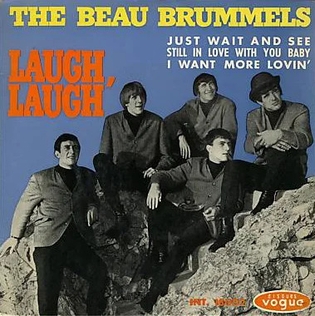
"Laugh, Laugh" is a song by American rock group the Beau Brummels, written by guitarist Ron Elliott and produced by Sylvester Stewart, later known as Sly Stone. Released in December 1964 as the band's debut single, the song reached number 15 on the U.S. Billboard Hot 100 chart the following February. "Laugh, Laugh" was the first hit single to come out of the emerging San Francisco music scene in response to the British Invasion. The song was later included on the band's first full-length album, Introducing the Beau Brummels, released in April 1965.

"You Tell Me Why" is a song by American rock group The Beau Brummels, from the band's second album, The Beau Brummels, Volume 2. The song was written by guitarist Ron Elliott and produced by Sylvester Stewart, later known as Sly Stone. "You Tell Me Why" was released as the album's lead single, and peaked at number 38 on the Billboard Hot 100 in August 1965. The band revisited the song and included it on their 1975 eponymous album. The original version later appeared on the band's 1987 compilation album The Best of The Beau Brummels 1964–1968.

Triangle is the fourth studio album by American rock band the Beau Brummels. Produced by Lenny Waronker and released in July 1967, it was the band's first album to include songs that vocalist Sal Valentino and guitarist Ron Elliott composed together. The band incorporated fantasy elements and surreal characters into the album's song titles and lyrics, and worked with a variety of session musicians to create Triangle's psychedelic musical style. The Beau Brummels were reduced to a trio—Valentino, Elliott, and Ron Meagher—at the time Triangle was recorded, as former group members Don Irving (guitars) and John Petersen (drums) left the band following the release of the group's previous album, Beau Brummels '66.

"Just a Little" is a song by the American rock group the Beau Brummels. The song is included on the band's debut album, Introducing the Beau Brummels, and was released as its second single, following "Laugh, Laugh". "Just a Little" became the band's highest-charting U.S. single, peaking at number eight on the Billboard Hot 100 in June 1965. It also reached the top 10 of the charts in Canada and Australia.

"Don't Talk to Strangers" is a song by American rock group The Beau Brummels, released as the second single from the band's second album, The Beau Brummels, Volume 2. The song later appeared on the band's 1987 compilation album The Best of The Beau Brummels 1964–1968. The single peaked at number 52 on the Billboard Hot 100 in November 1965; its relatively low chart placement possibly being the result of the band's label, Autumn Records, verging on collapse at the time. The song reached number 16 on the Canadian singles chart.

Bradley's Barn is the fifth studio album by the American rock group the Beau Brummels. Released in October 1968, it contains the singles "Long Walking Down to Misery" and "Cherokee Girl." The album has received critical acclaim as an early example of country rock. Bradley's Barn is actually a recording studio in Nashville owned by Owen Bradley.

The Beau Brummels were an American rock band that formed in 1964 and originally consisted of singer Sal Valentino, lead guitarist Ron Elliott, bassist Ron Meagher, rhythm guitarist Declan Mulligan and drummer John Petersen. Local radio disc jockeys Tom Donahue and Bobby Mitchell discovered the band at a club near San Francisco. They signed the Beau Brummels to their fledgling Autumn Records label, and their house producer, Sylvester Stewart, later known as Sly Stone, recorded the band's early sessions.
"Good Time Music" is a song originally recorded by the American folk-rock band the Lovin' Spoonful in 1965. Written by John Sebastian, it appeared on the 1966 Elektra Records compilation What's Shakin'. Author Richie Unterberger characterizes the song as "a sort of manifesto of the group's optimism in its jaunty rhythms and celebration of the return of good time music to the radio."
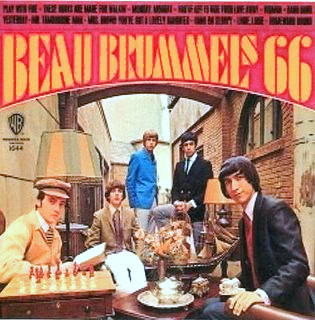
Beau Brummels '66 is the third studio album by the American rock group the Beau Brummels, and their first on Warner Bros. Records. The album consists of twelve cover songs and no originals. Autumn Records, the band's previous label, had sold the band to Warner Brothers in early 1966. Warner Brothers, however, did not control the publishing rights, and opted to have the band record an album of covers, including songs originally performed by The Beatles and Bob Dylan, as well as recent hit singles by such acts as The Mamas & the Papas and Simon & Garfunkel. Lead vocalist Sal Valentino explained, "When we went to Warner Brothers, they were just anxious to get a record out, to capitalize on the success we had. That record was the wrong one to do at the time."

"Here We Are Again" is a song by American rock group The Beau Brummels. It was released in 1966 as the band's second single on Warner Bros. Records, following their cover of Bob Dylan's "One Too Many Mornings," released earlier that year. "Here We Are Again" was the first Beau Brummels' A-side written by lead vocalist Sal Valentino.
"Magic Hollow" is a song by American rock group The Beau Brummels, from the band's fourth album, 1967's Triangle. The song, written by guitarist Ron Elliott and lead singer Sal Valentino, was released as the album's first single. The song appeared on the band's 1987 compilation album The Best of the Beau Brummels 1964-1968, and "Magic Hollow" also served as the title of the band's 2005 four-disc box set.

The Beau Brummels is the sixth studio album by the American rock band of the same name. Released in April 1975, the album features the work of all five original band members for the first time since the band's debut album, 1965's Introducing the Beau Brummels. The album peaked at number 180 on the U.S. Billboard 200 albums chart in 1975.
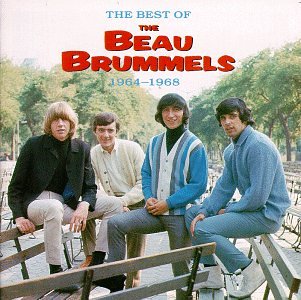
The Best of the Beau Brummels 1964-1968, sometimes titled The Best of the Beau Brummels: Golden Archive Series, is a compilation album by American rock band The Beau Brummels. Released in 1987 by Rhino Records, the album features 18 songs, including the band's biggest hit singles—"Laugh, Laugh", "Just a Little", "You Tell Me Why", and "Don't Talk to Strangers"—as well as songs which never appeared on an album before this collection, such as the 1967 single "Here We Are Again".

San Fran Sessions is a box set compilation which collects 60 demos, outtakes, rarities and unissued performances recorded by The Beau Brummels from 1964 to 1966. The three-disc set, released by Sundazed Records on June 11, 1996, includes alternate takes of the band's singles "Laugh, Laugh" and "Just a Little", as well as early versions of songs that were likely targeted for their never-completed third album on Autumn Records.
Not to be confused with Styx (band)
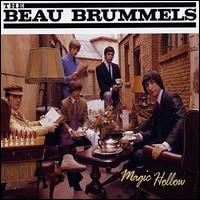
Magic Hollow is a box set compilation by The Beau Brummels comprising 113 songs recorded between 1964-1968, including hit singles, demos, outtakes, rarities and previously unissued material. The set was released on June 21, 2005 by Rhino Handmade.
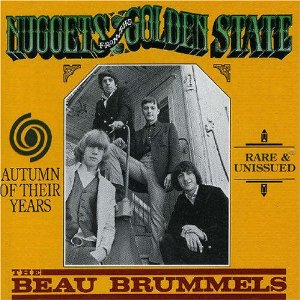
Autumn of Their Years is a compilation album by American rock band The Beau Brummels. It was released in 1994 by Big Beat Records, and re-released in 2003 by Ace Records. The album consists of 26 songs recorded by the band during their stint at Autumn Records, including previously unreleased demos and outtakes.
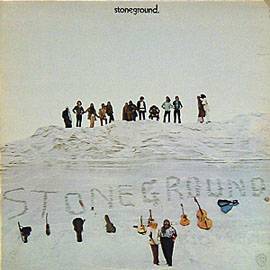
Stoneground is the debut studio album by American rock band Stoneground, released in 1971 on Warner Bros. The album featured seven different lead vocalists, including Sal Valentino on four of the album's ten songs.















